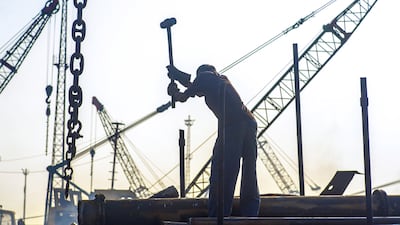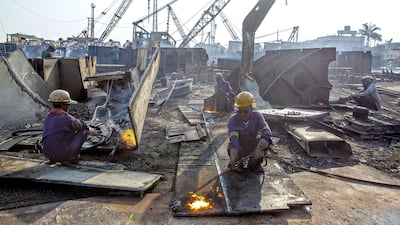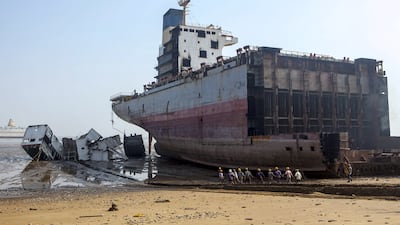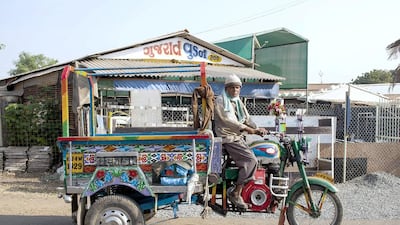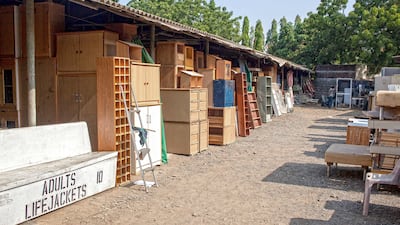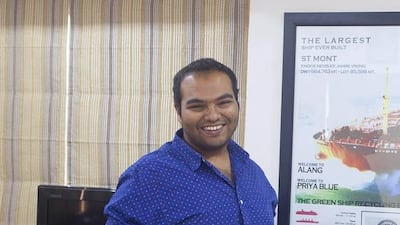ALANG, GUJARAT // Gaurav Mehta proudly recalls the day his company was awarded a Guinness World Records title for the largest ship to be scrapped a few years ago.
The task of ripping apart the 1,504-foot-long tanker, Seawise Giant, was completed in nine months by 500 labourers on the west coast of India, in the state of Gujarat, on the shores of Alang, the world's biggest ship-breaking yard, often described as "a graveyard for ships".
Today, Mr Mehta’s vast plot on Alang’s beach is empty and idle, however, except for a lone stray dog gambolling about the open stretch of sand and water. Low steel prices amid a glut of cheap Chinese imports, along with the weakness of the Indian rupee, mean money will be lost in the current market from buying and scrapping a ship. That’s why his business has been on hold for the past month, he explains. Just 30 of the 130 once operational ship-breaking plots at Alang are active while the others have shut down, figures from the Ship Recycling Industries Association India reveal.
“We’ve completely stopped, meaning I don’t have a vessel to scrap,” says Mr Mehta, who is a director of Priya Blue Industries, a ship-breaking company owned by his father. “The market has been going down and also the dollar is increasing, so because of that we were losing too much money. The shoreline used to be full of ships. In the good days, there were very good margins.”
Cruise liners that once carried hundreds of tourists to exotic locations and huge container ships that made voyages to far-flung ports are among the vessels from all over world that have ended up on Alang’s shores after they are deemed to have come to the end of their working lives. They are scrapped mainly for their steel because the metal can be sold on for use in construction, for example. Other components of the vessel, including the mechanical parts, lifeboats and furniture, are also sold off to maximise revenues.
Until recently, Alang’s beaches were swarming with activity as ship-breaking firms profited from this labour-intensive, grimy exercise of demolishing these vessels. This dirty work can more easily and cost-effectively be done in countries such as India, Bangladesh and Pakistan, because of lower labour costs and fewer restrictions when it comes to dealing with hazardous materials such as asbestos and lead, as well as environmental pollution, compared to many other parts of the world. Now just a handful of ships are being torn down in Alang.
“We don’t really have any business,” says Pradeep Bansal, who owns Shreeji Marine Agency and acts as an agent for ship breakers in Alang. “We are doing nothing. I’m just spending money, losing money.”
Data from the Ship Recycling Industries Association India shows that the number of ships being scrapped at Alang has fallen sharply over the past three years. In 2012, the industry reached a peak, with a total of 432 ships recycled at Alang. That reduced to 306 in 2013, then to 286 in 2014. In the first 10 months of this year, only 164 ships scrapped, compared to 251 in the same period last year. Last month, only four ships were recycled in Alang, while there were 16 in the same month last year and 40 in October 2012.
“It’s pertinent to note that forex and inventory losses would have been staggering had ship-breaking activity continued at the [same] pace,” according to Crisil Ratings, a unit of Standard & Poor’s rating agency.
Those owners of ship-breaking businesses “with deep pockets have so far managed to sail in these choppy waters”, according to Crisil. “The worry is, if steel prices don’t rise and the rupee remains volatile, the world’s largest graveyard for ships could turn into one for shipbreakers, too.”
The rupee has depreciated to more than 66 against the dollar compared to about 62 a year ago, making it more costly for breakers of ships to buy vessels.
This has “added to the woes of an industry already reeling under 12 billion rupees [Dh659.8 million] of cumulative forex losses in the last three fiscals”, Crisil says.
“The 12-month period [to September this year] saw domestic steel demand muted, resulting in a 23 per cent decline in average realisation on scrap steel from 26,504 rupees per tonne in October 2014 to 20,398 rupees per tonne in September 2015. The price of scrap steel, which was declining between 2 per cent and 4 per cent on a monthly basis, plunged nearly 20 per cent after China moved to de facto devalue the yuan in August 2015.”
The ship-breaking plot of VMS Industries in Alang offers a glimpse into the heydays of the industry and just what a huge undertaking it is to demolish a ship. In the heat of the afternoon sun, 200 labourers are at work dismantling a bulk carrier, which used to be owned by a German company. A team of men rushes by carrying a steel plate, anxious to offload it on to a lorry as they buckle under its tremendous weight. Others are on the beach using blowtorches to cuts sheets of metal into smaller pieces. Many more are on the ship itself, gradually tearing it apart.
Ajit Kumar Jain, whose family owns the company, says he remains optimistic about the industry, although other shipbreakers in Alang say he will definitely make a loss on the ship currently being scrapped.
“We will buy another ship after we finish this one,” says Mr Jain. “I don’t think the market will go down further. In this business, or any business, it may be up or it may be down. One year you gain and one year you lose. It’s not confirmed that we will lose money on this ship. We’ve only scrapped 10 per cent of it so far, so perhaps tomorrow the market may be up.”
Weary labourers from various sites congregate at a chai stall in Alang on a midday break.
“Many of the labourers have left Alang because there isn’t enough work for everyone,” says Balram Bahra, 20, from the eastern Indian state of Odisha. He has worked in Alang for the past three years, loading steel plates on to lorries, earning 240 rupees a day. He says he is worried about his livelihood, and may have to return to Odisha to become a farm labourer.
Workers in Alang typically come from poor states including Bihar, Odisha, and Uttar Pradesh.
Labourers explain that they would earn less than half of what they can make in Alang if they remained in their home states. Mr Bahra says that he would earn 100 rupees a day labouring on a farm in Odisha.
Another Alang labourer, Rohit Pradhan, 38, also from Odisha, says he likes the work, despite the fact that it is tough and he has scars to show from various injuries he has suffered from his 20 years at the ship-breaking yard.
“I’m worried there will be fewer and fewer jobs,” says Mr Pradhan, who supports his wife and two sons with the 300 rupees he earns a day.
And Mr Mehta is also concerned that the industry will not pick up any time soon.
“You can buy a new plate at the same price as a scrap steel plate because of China, so no one is going to buy scrap steel,” he says, adding that ships are going to Pakistan and Bangladesh now instead of India, where labour is even cheaper.
“We try to remain hopeful that things will improve,” says Mr Mehta. “This business has always been a cycle. But this time we are not very hopeful because it has never been so bad.”
business@thenational.ae
Follow The National's Business section on Twitter
